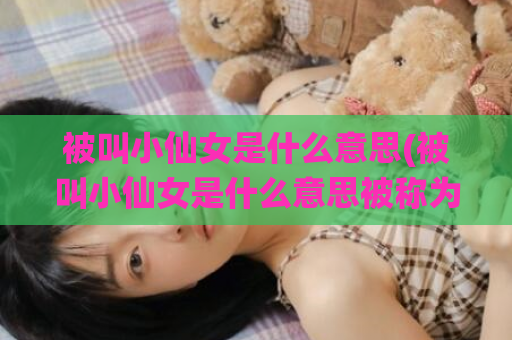Introduction: In modern society, language evolves rapidly, and new terms and phrases emerge constantly, often influenced by popular culture, social media trends, or regional dialects. One such term that has gained traction recently is "被叫小仙女是什么意思" (What does it mean to be called Little Fairy). This phrase, predominantly used in Chinese-speaking communities, has sparked curiosity and discussion among netizens, prompting many to seek its deeper meaning and implications. In this comprehensive article, we delve into the origins, connotations, and interpretations of this intriguing expression, shedding light on its significance in contemporary discourse.
Understanding the Term

1. Origins: The term "被叫小仙女" combines several Chinese characters to convey a specific meaning. "被叫" (bèi jiào) translates to "being called," while "小仙女" (xiǎo xiān nǚ) literally means "little fairy." When used together, the phrase denotes the act of addressing someone as a "小仙女" or "little fairy."
2. Popularity: The phrase has gained popularity in online communities and social media platforms, particularly among younger demographics. It is often used affectionately or playfully to refer to individuals, especially women, who exhibit certain qualities or characteristics associated with the archetype of a fairy.
Interpretations and Connotations
1. Aesthetic Appeal: Being called "小仙女" typically implies that the person possesses qualities such as delicacy, grace, and ethereal beauty. It evokes imagery of a mystical being, adorned with wings and radiating an otherworldly charm.
2. Personality Traits: Beyond physical appearance, the term also conveys certain personality traits often attributed to fairies, such as kindness, innocence, and a whimsical demeanor. Those labeled as "小仙女" may be perceived as gentle souls with a penchant for enchantment.
Social and Cultural Significance
1. Gender Dynamics: The prevalence of "小仙女" in colloquial language reflects broader societal attitudes towards femininity and beauty. While the term can be endearing, it also perpetuates certain stereotypes about women, emphasizing ideals of fragility and purity.
2. Online Discourse: On social media platforms, the use of "小仙女" has sparked discussions about self-image, identity, and the pressure to conform to unrealistic standards of beauty. Some embrace the term as a form of empowerment, while others critique its narrow portrayal of femininity.
Conclusion
Through this exploration, we gain insight into the multifaceted nature of the phrase "被叫小仙女是什么意思." While on the surface, it may seem like a simple term of endearment, its implications run deeper, reflecting societal norms, cultural perceptions, and individual interpretations. Whether embraced or challenged, the term serves as a lens through which we examine notions of beauty, femininity, and self-expression in contemporary discourse.
The editor says: The concept of being called "小仙女" encapsulates more than just a cute nickname; it embodies complex ideas about identity, gender, and societal expectations. By dissecting its meaning and significance, we gain a deeper understanding of the evolving language and cultural dynamics shaping our world.
有话要说...